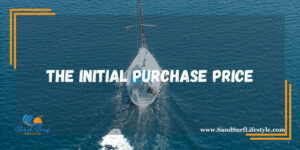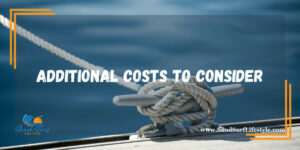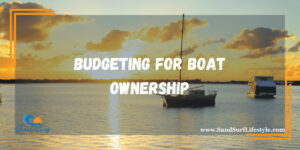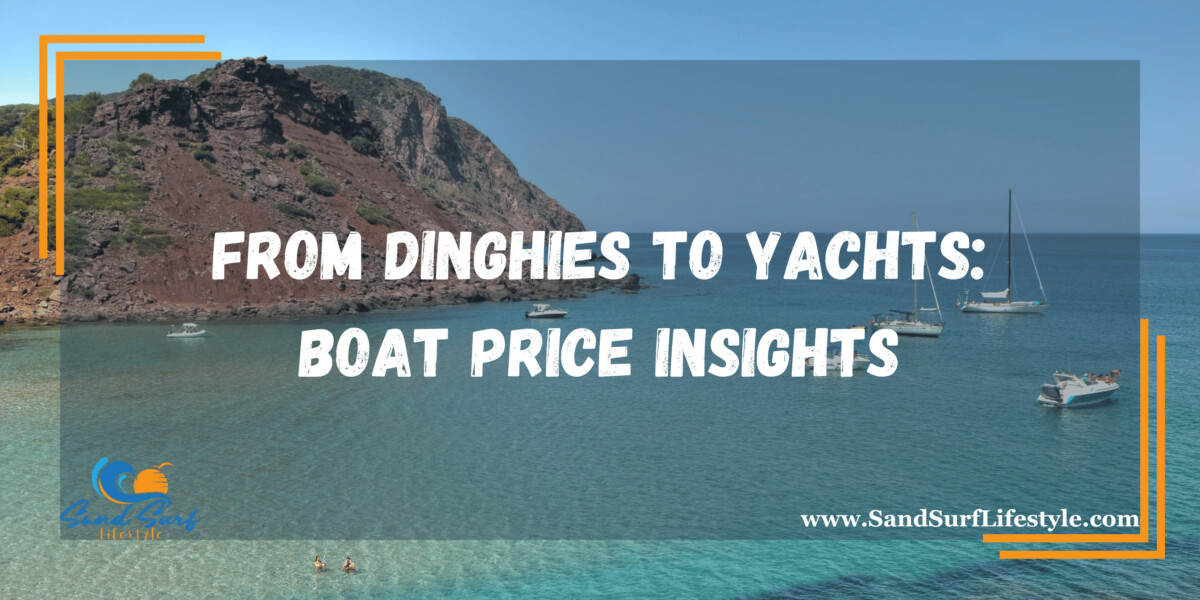When it comes to the dream of owning a boat, many enthusiasts imagine the wind in their hair and the open water ahead. But beyond the allure of maritime adventures lies a crucial consideration: the cost. Owning a boat can be an incredibly rewarding experience, but it’s essential to understand the financial commitment involved.
The Initial Purchase Price

The first and most significant financial hurdle in boat ownership is the purchase price. The cost of a boat can vary widely depending on several factors:
1. Boat Type
The choice of boat type is a fundamental determinant of its price. Smaller, more straightforward boats like fishing vessels are generally more budget-friendly than their opulent counterparts, such as luxury yachts or motor cruisers. The cost variation between these categories can be substantial. It’s crucial to align your boat selection with your intended use and budget to ensure a financially sound investment in your maritime pursuits.
2. Size
Size matters in the world of boats, and it significantly influences the price. Larger vessels inherently command a higher price tag due to the increased material requirements, construction complexity, and added amenities. For instance, a compact sailboat may cost a fraction of the price of a spacious motor yacht. When contemplating boat ownership, carefully consider your budget and intended usage, as a smaller boat might offer a more economical entry point.
3. New vs. Used
The choice between a new or used boat presents a substantial financial trade-off. New boats boast the latest features, warranties, and pristine condition but come at a premium price. In contrast, used boats often provide substantial cost savings, but older vessels may necessitate more frequent maintenance and repairs. To optimize your investment, assess your willingness to balance initial costs with potential long-term upkeep expenses.
4. Features and Amenities
The extent of features and amenities onboard your boat directly correlates with its overall cost. Boats equipped with advanced navigation systems, luxurious interiors, top-notch entertainment facilities, and other high-end amenities will naturally be more expensive. When contemplating these extras, consider your boating goals and whether these features enhance your experience. Choosing wisely based on your preferences and budget ensures that you derive maximum enjoyment from your investment.
To learn how much sailing costs, check out this article.
Registration and Insurance
Once you’ve purchased your boat, you’ll need to factor in ongoing expenses like registration and insurance:
1. Registration
Boat registration is a vital aspect of boat ownership that demands attention. Registration requirements and associated fees vary by location, so it’s essential to conduct thorough research on the specific regulations in your area. Some regions may require both state and federal registration, each with its associated fees. Additionally, be prepared for periodic renewal costs. By understanding and budgeting for these expenses, you ensure compliance with legal requirements and prevent any surprises related to boat registration fees, allowing you to enjoy your vessel without undue financial stress.
2. Insurance
Securing boat insurance is a prudent step in safeguarding your valuable investment. The cost of boat insurance fluctuates depending on several factors, including the boat’s type, size, age, and the level of coverage you select. Moreover, the location where you operate the boat can also impact insurance rates. Coastal areas or regions prone to natural disasters may incur higher premiums. To make an informed choice, assess your insurance needs carefully and obtain quotes from multiple providers. While insurance adds an ongoing expense, it offers essential protection against unforeseen events and liability, granting you peace of mind while on the water.
Maintenance and Repairs
Boat ownership comes with ongoing maintenance and repair costs that can accumulate over time:
1. Regular Maintenance
Regular boat maintenance is the cornerstone of responsible ownership. It encompasses a range of tasks, from the routine cleaning of your vessel to comprehensive engine checks and thorough hull inspections. Engaging in these activities at recommended intervals is not only a matter of safety but also a savvy financial move. Consistent maintenance helps detect minor issues before they escalate into major, costly problems. By investing in preventative care, you not only prolong the life of your boat but also ensure that it remains a reliable and enjoyable part of your life on the water.
2. Winterization
For boat owners in regions with harsh winter climates, winterization is an indispensable process. It involves a series of protective measures to shield your boat from the freezing temperatures and adverse conditions that can cause damage. This includes thorough engine preparation, shrink-wrapping the boat to prevent exposure to the elements and secure storage. While winterization comes with additional costs, it is a safeguard against potential cold-weather damage, such as frozen pipes and cracked hulls. Prioritizing winterization preserves your investment and minimizes unexpected repair expenses.
3. Repairs
Despite meticulous maintenance, accidents and wear and tear can result in unforeseen repair expenses during your boat’s lifespan. These unexpected repairs can range from engine malfunctions to hull damage. To navigate these financial challenges without undue stress, it’s wise to establish a financial cushion specifically earmarked for boat repairs. This fund can serve as a safety net, allowing you to promptly address issues as they arise, preventing them from escalating into more extensive and costly problems. Being prepared for repairs is a responsible aspect of boat ownership, ensuring uninterrupted enjoyment of your vessel.
Operating Expenses
Operating a boat also entails various expenses that boat owners should consider:
1. Fuel
Fuel expenses are a significant consideration in boat ownership, and they can fluctuate based on your boat’s engine type and how frequently you take it out on the water. Boats with larger, more powerful engines typically consume more fuel. Additionally, your usage patterns, such as cruising speed and distance, impact fuel costs. It’s crucial to incorporate these expenses into your budget and monitor them closely, as fuel costs can vary seasonally and regionally. By planning for regular fuel expenses, you ensure that you can enjoy your boating adventures without unexpected financial constraints.
2. Docking and Storage
Docking and storage fees are recurring expenses for boat owners, especially for those without a private dock or storage facility. Renting a slip or storage space is essential for keeping your boat safe and accessible. The cost of these amenities can vary widely based on factors like location, size of the boat, and the amenities provided by the marina or storage facility. In prime waterfront locations, these fees can be notably higher. It’s advisable to research and budget for these costs in advance to avoid any financial surprises associated with boat storage and accessibility.
3. Maintenance Supplies
To maintain your boat’s condition and functionality, budgeting for maintenance supplies is crucial. This category encompasses expenses related to cleaning supplies, spare parts, lubricants, and other essential items needed to keep your boat in optimal working order. Regular maintenance supplies ensure that your boat remains safe and enjoyable to use, preventing more extensive and costly repairs down the road. As part of responsible boat ownership, allocate funds for these necessities in your budget, making it easier to address maintenance needs promptly and extend the life of your vessel.
Depreciation
Depreciation is a crucial but often overlooked factor in boat ownership. Similar to automobiles, boats also lose value over time. This gradual decrease in value means that the resale price of your boat may not match the initial purchase price, potentially affecting your return on investment. Understanding depreciation is essential when evaluating the long-term cost of boat ownership. While depreciation can’t be eliminated, selecting a boat with a reputation for holding its value or focusing on well-maintained used boats can mitigate the impact. Factoring in depreciation helps you make informed financial decisions and manage your expectations regarding the future resale value of your boat.
Financing Costs
Financing a boat purchase can introduce additional expenses that significantly affect the overall cost. When you opt for a boat loan, you’ll encounter interest charges and potentially other fees. The interest rate on your loan depends on various factors, including your credit score, the loan term, and market conditions. These financing costs can be substantial over the life of the loan, potentially adding thousands of dollars to the boat’s purchase price. It’s essential to carefully consider the terms of your loan and calculate the total cost of financing to ensure it aligns with your budget and long-term financial goals.
Additional Costs to Consider

1. Boating Licenses and Courses
In certain regions, obtaining a boating license or completing safety courses is a mandatory requirement for boat owners. These courses often cover essential aspects of safe boating, navigation, and rules of the water. While the knowledge gained from such courses is invaluable for safety, they may also come with associated fees. These fees can vary by location and the complexity of the course. It’s crucial to research the specific requirements in your area and budget for any associated costs, ensuring that you comply with regulations and prioritize safe boating practices.
2. Towing and Trailering
If your boating adventures involve moving your vessel to different waterways or locations, you’ll need to consider the expenses associated with towing and trailering. This includes the cost of a boat trailer, which can range from affordable to high-end, depending on features and capacity. Additionally, towing your boat requires a suitable vehicle with the towing capacity and proper hitching equipment. Factor in fuel costs for towing, potential tolls, and any required permits for oversized loads. Proper planning for towing and trailering expenses is essential for seamless and cost-effective boat transportation.
3. Upgrades and Customizations
Boat owners often desire to personalize and enhance their vessels over time. This can involve a wide range of upgrades and customizations, from aesthetic improvements like a new paint job or upholstery to functional enhancements like advanced navigation equipment or fishing gear. While these upgrades can enhance your boating experience, they also come with associated costs. Budgeting for such improvements allows you to prioritize and plan for enhancements that align with your preferences and evolving needs, ensuring that your boat remains a source of pride and enjoyment.
4. Taxes
The tax implications of boat ownership can vary by location and may include sales tax and property tax. Some areas apply sales tax when you initially purchase the boat, while others impose annual property taxes based on the assessed value of your vessel. The rates and regulations regarding boat taxes differ widely between states and countries. It’s vital to research the tax laws in your area and budget accordingly to account for these potential expenses, ensuring that you remain in compliance with local tax regulations.
Total Cost of Ownership
When evaluating the full scope of boat ownership, it’s evident that the financial commitment extends well beyond the initial purchase price. The total cost of owning a boat is a complex equation influenced by numerous variables, such as boat type, size, age, location, and usage. A small, well-maintained, used boat might entail annual expenses in the range of a few thousand dollars, making it a relatively economical choice. Conversely, opting for a large luxury yacht can result in annual costs that soar into the hundreds of thousands. By understanding the diverse factors that contribute to boat ownership expenses, you can tailor your choices to align with your budget and preferences while enjoying the pleasures of life on the water.
Budgeting for Boat Ownership

To make boat ownership a sustainable and enjoyable endeavor, diligent budgeting is essential. Here are some tips for managing your boat-related expenses:
1. Create a Detailed Budget
Crafting a comprehensive budget is the cornerstone of responsible boat ownership. This budget should be meticulous, encompassing all expected expenses associated with owning a boat. It should factor in not only the initial purchase price but also recurring costs like maintenance, insurance premiums, fuel, docking fees, and even less predictable expenses like emergency repairs. A well-structured budget provides financial clarity, enabling you to make informed decisions and ensuring that your boating experience remains enjoyable without causing undue financial strain.
2. Emergency Fund
Maintaining an emergency fund specifically allocated for your boat is a prudent financial strategy. Unexpected repairs or unforeseen financial setbacks related to your vessel can arise at any time. Having an emergency fund in place provides a safety net, allowing you to address these challenges promptly without compromising your financial stability. It’s advisable to regularly replenish this fund to ensure that it’s ready to tackle any unexpected boat-related expenses that may arise.
3. Regular Maintenance
Cutting corners on routine maintenance is a common pitfall for some boat owners, but it’s a costly mistake in the long run. Regular maintenance is an investment in preventing more significant and more expensive issues from developing over time. A well-maintained boat not only operates more efficiently but also retains its value better, which can be crucial if you plan to sell it in the future. Skimping on maintenance may save money in the short term but can result in more substantial costs down the line, making responsible upkeep a financial priority.
4. Comparison Shopping
Boat ownership involves purchasing equipment, supplies, and services, all of which come with varying price tags. To optimize your budget, engage in comparison shopping. Compare prices for everything from boat parts and accessories to marina services and insurance providers. Explore different suppliers, negotiate when possible, and look for cost-effective options without compromising on quality or safety. By actively seeking the best deals, you can maximize the value of your boat ownership experience while keeping your expenses in check.
5. Resale Value
If you anticipate selling your boat in the future, consider its resale value when making your initial purchase. Some boat models and brands hold their value better than others. Resale value depends on factors like brand reputation, maintenance history, and overall condition. By selecting a boat with a reputation for retaining value, you can potentially recoup a higher percentage of your initial investment when it’s time to sell. This approach not only offers peace of mind during ownership but also aligns your boat ownership experience with long-term financial goals.
To discover binoculars for sailboat watching, check out this article.
Conclusion
Owning a boat can provide unforgettable experiences and a sense of freedom on the water. However, it’s crucial to enter into boat ownership with a clear understanding of the costs involved. By factoring in the purchase price, ongoing expenses, and potential unforeseen costs, you can make informed decisions and fully enjoy your time on the open seas without financial stress. With proper planning and budgeting, the dream of boat ownership can become a reality for many avid water enthusiasts.
Please note that the contents of this blog are for informational and entertainment purposes only and should not be construed as legal advice. Any action taken based on the information provided in this blog is solely at your own risk. Additionally, all images used in this blog are generated under the CC0 license of Creative Commons, which means they are free to use for any purpose without attribution.

